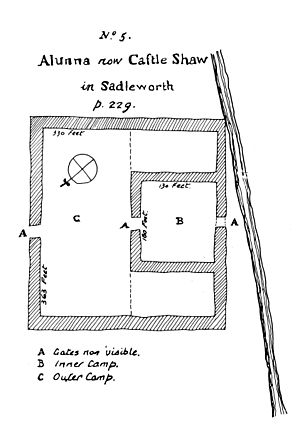Thomas Percival (antiquarian) facts for kids
Thomas Percival (born 1719, died 1762) was an English historian and expert on old things, known as an antiquary. He spent his life studying ancient objects and places, especially Roman sites in England.
Contents
About Thomas Percival
Thomas Percival was born on September 1, 1719, at Royton Hall, near Oldham in Lancashire, England. His father was Richard Percival. Thomas grew up following the Presbyterian faith, but later chose to join the Church of England.
In politics, Percival was a supporter of the Whig party. This meant he believed in the Hanoverian succession, which was about who should be the next king or queen of England. He supported the family that eventually became the British royal family we know today.
His Achievements
Thomas Percival was a respected scholar. On November 25, 1756, he was chosen as a Fellow of the Royal Society. This is a very old and famous group for scientists. Later, on June 12, 1760, he also became a Fellow of the Society of Antiquaries of London. This society is dedicated to studying history and ancient objects.
Percival passed away in December 1762. He was buried in St. Paul's Church in Royton, the town where he was born.
His Writings and Discoveries

Thomas Percival wrote several important papers and books during his life. He was not afraid to share his opinions.
Political Writings
In 1748, Percival wrote two pamphlets, which are like small books, to disagree with some local church leaders. These leaders were from the Collegiate Church of Manchester. His pamphlets were called A Letter to the Reverend the Clergy of the Collegiate Church of Manchester and Manchester Politics: a Dialogue between Mr. Trueblew and Mr. Whiglove.
He especially criticized a person named John Clayton. Clayton had shown support for the Jacobites during the 1745 rebellion. The Jacobites were people who wanted to bring back the old royal family to the throne. Percival was following the lead of Josiah Owen, who had also written against Jacobite ideas.
Supporting Workers
In 1758, Percival got involved in a disagreement between weavers and their employers about wages. He wrote about his experiences in a book called A Letter to a Friend occasioned by the late Dispute betwixt the Check-Makers of Manchester and their Weavers; and the Check-Makers' Ill-usage of the Author. This book was published in Halifax in 1759.
Studying Roman History
Percival was very interested in Roman roads. He wrote articles about them for important publications like Philosophical Transactions and Archæologia. He made an important discovery when he found that Kinderton was the site of an ancient Roman salt production center called Condate.
Some of the maps and plans of old ruins found in John Aikin's book, Country round Manchester, were actually drawn by Thomas Percival himself. This shows his skill in mapping and studying ancient sites.
His Family
Thomas Percival married Martha Gregge. She was the daughter of Major Benjamin Gregge from Chamber Hall, Oldham. Martha passed away in 1760 when she was 45 years old.
They had one child, a daughter named Katherine. Katherine later married Joseph Pickford of Alt Hill, Lancashire. Joseph Pickford later became known as Sir Joseph Radcliffe, 1st Baronet. Thomas Percival's collection of family history papers and other important documents were passed down to Sir Joseph Radcliffe.

